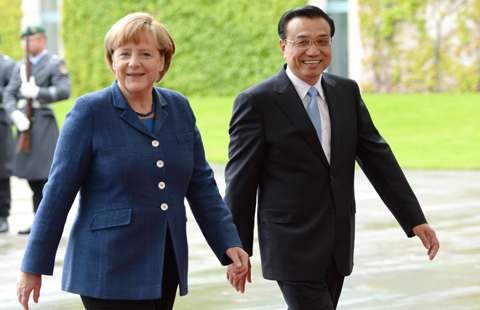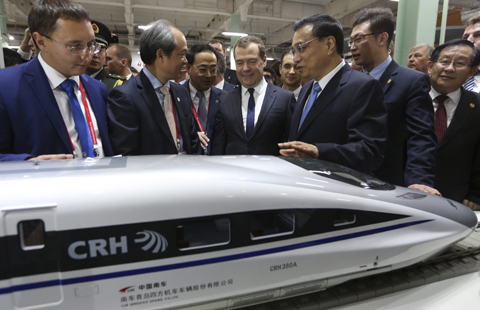
'Localization' helps Chinese companies grow in Germany
Comments Print Mail Large Medium SmallChinese companies in Germany have found that "localization" - hiring local workers, complying with local regulations and understanding the local culture - is a successful strategyto build their business and reputation in the country and elsewhere in Europe.
More than half the workforce of Sany Germany, the German arm of Chinese construction machine giant Sany, used to be Chinese, but now 80 percent of its workers are European.
For Huawei, a leading global information and communications technology provider, its employees in Germany and other parts of Europe are from those areas. Localization of jobs earns it wider recognition, company officials say.
“Sany Germany is the daughter company of a Chinese company but is itself a completely European company. The company's operational management team is entirely European, and we do business in a European way, fully compliant with all legal and ethical requirements and customer expectations,”said Bart Decroos, the managing director of Sany Germany.
“Every market is unique...It is essential to be open to understanding the specifics of each market. Especially the European market is complex and demanding in terms of legal requirements, customer expectations on product reliability, durability and flexibility, and especially after-sales support. Without understanding and addressing these, any venture into the European market will be a short and unsuccessful one,”said Decroos.
Sany Group, a Changsha, Hunan-based company, is one of the first Chinese companies to enter, evolve and thrive in the advanced German market.
Sany Germany has carved an important niche for itself since it first arrived in 2008. Since then, the company has grown exponentially, developing, producing and distributing mobile port machinery and other construction and lifting equipment to customers in Europe and surrounding markets.
In 2012, Sany Group announced it had bought German concrete pump maker Putzmeister for about $470 million, the largest direct investment by a Chinese company in Germany.
Huawei has had the same experience as Sany.
Since it began operating in Germany in 2001, Huawei has been the biggest Chinese company in the country, said Patrick Berger, communications manager of Huawei Germany.
Particularly in Germany, with its advantage in providing innovative and customized products and services, the Chinese company works closely with local telecommunication operators and has achieved remarkable success, benefiting both the firm and German society, company officials say.
In June, Huawei received an award in the western German city of Dusseldorf for its outstanding investments in the German state of North Rhine-Westphalia.
Several years ago, Chinese investments in Germany caused some concern locally, and there was talk of a“Chinese invasion”and that“China is buying up Germany”.
Some German company owners said they feared that Chinese buyers would dismantle their companies and cut or transfer jobs to China.
In recent years, however, as Chinese companies develop well locally, Germany's attitude toward Chinese investment have changed.
“Facts have proved that Chinese companies which invest in Germany are not looking for a one-off deal, and they are not there to steal technology. They are committed to long-term development in Germany in order to expand global business,”said Shi Mingde, the Chinese ambassador to Germany.
Chinese investment in Germany has been beneficial for German jobs and the economy, Shi said.
Shi also said that Chinese companies that want to gain a strong foothold in foreign enterprises need to be familiar with local regulations and policies, understand the local cultural traditions and customs, learn to deal with local government agencies and local people, and adapt to the enterprise culture and public opinion.
Related Stories
China, Germany vow to lift partnership to higher levels 2014-10-10 23:07
China, Germany sign $18.1 billion deals 2014-10-10 21:25
Qingdao establishes relations with Germany 2014-10-10 17:22
Premier Li to co-chair China-Germany govt consultation 2014-10-10 11:25
Premier Li visits Germany, Russia, Italy 2014-10-10 10:04
Germany seeking a strong partnership 2014-10-10 07:51
Germany's link to China 2014-10-10 07:32
Li arrives in Germany, first leg of Europe trip 2014-10-09 22:52
Time ripe for innovative China-Germany partnership 2014-10-09 17:07
Background






